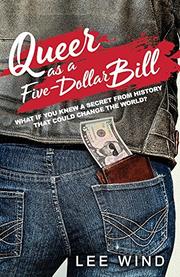 A regular blogger for the Society of Children’s Book Writers and Illustrators and the compiler of award-winning database I’m Here, I’m Queer. What the Hell Do I Read? Lee Wind can now add novelist to his list of credits with Queer as a Five Dollar Bill. This engaging and thought-provoking story portrays 15-year-old Wyatt, whose parents own a themed bed-and-breakfast in a small Oregon town dedicated to the life and legacy of Abraham Lincoln. In his conservative community, Wyatt is deep in the closet, using an invented romance with longtime friend Mackenzie to throw bullies like their childhood friend Jonathon off his trail. But when a social studies project leads Wyatt to explore Lincoln’s life in more depth, he discovers that the one-day sixteenth President likely shared a bed with close friend and confidant Joshua Fry Speed. As part of the school assignment Wyatt sets up a blog that garners national attention but also outrage from homophobes who believe he has destroyed Lincoln’s reputation. Both fans and enemies of Wyatt’s blog descend on Lincolnville—among them, a lawyer whose teenage son, Martin, is openly gay. Wyatt’s relationship with Martin has its tender moments as well as heartbreak. The challenges Wyatt faces in an intolerant community are daunting, but over the course of the year, this determined and likable teenager learns the value of friends and allies and finds them in unexpected places.
A regular blogger for the Society of Children’s Book Writers and Illustrators and the compiler of award-winning database I’m Here, I’m Queer. What the Hell Do I Read? Lee Wind can now add novelist to his list of credits with Queer as a Five Dollar Bill. This engaging and thought-provoking story portrays 15-year-old Wyatt, whose parents own a themed bed-and-breakfast in a small Oregon town dedicated to the life and legacy of Abraham Lincoln. In his conservative community, Wyatt is deep in the closet, using an invented romance with longtime friend Mackenzie to throw bullies like their childhood friend Jonathon off his trail. But when a social studies project leads Wyatt to explore Lincoln’s life in more depth, he discovers that the one-day sixteenth President likely shared a bed with close friend and confidant Joshua Fry Speed. As part of the school assignment Wyatt sets up a blog that garners national attention but also outrage from homophobes who believe he has destroyed Lincoln’s reputation. Both fans and enemies of Wyatt’s blog descend on Lincolnville—among them, a lawyer whose teenage son, Martin, is openly gay. Wyatt’s relationship with Martin has its tender moments as well as heartbreak. The challenges Wyatt faces in an intolerant community are daunting, but over the course of the year, this determined and likable teenager learns the value of friends and allies and finds them in unexpected places.
Wind’s debut YA novel is honest, powerful, and well-written and will be especially useful for young people living in similar communities to Wyatt’s. Given that teens cannot choose where they grow up, how can a queer teen survive in hostile territory? What are the costs of coming out, and of trying to open closed minds? These are all important questions that Wyatt faces as he tries to find solace and connection in Abraham Lincoln’s relationship with Joshua Fry Speed and to spread acceptance by blogging about his research. Wind has also done his research and has an extensive afterword in which he offers the same evidence that Wyatt uses, allowing readers to make up their own minds about Lincoln and Speed’s relationship.
In a sense, Wyatt’s blogging experience parallels the publishing journey of Queer as a Five-Dollar Bill, which was rejected by multiple commercial publishers as too controversial and languished in other publishers’ inboxes with no response at all. Wind then turned to crowdfunding and raised enough money in six days – from 182 contributors – to pay for professional editing, design, and production. I expect that countless teens and adults will appreciate Wind’s courage and the generosity of his supporters who made this book possible.
1 comment for “Too Controversial to Publish? A Review of Queer as a Five-Dollar Bill”